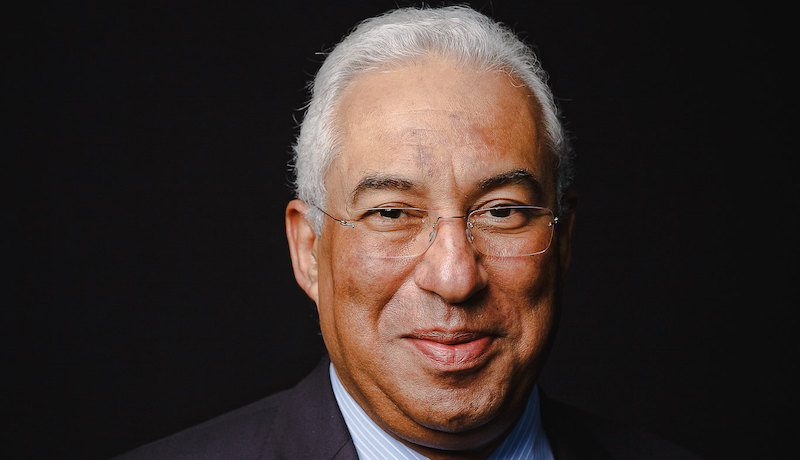By Alexandra Brzozowski, Aurélie Pugnet, Magnus Lund Nielsen and Max Griera
(EurActiv) — As EU leaders descended on Brussels on Monday (17 June) for an informal EU top job dinner that could see an early political deal on the issue, some asked for clarification as to the Portuguese top job candidate António Costa’s legal woes.
As Monday’s summit kicked off, EU leaders were widely expected to seal a quick ‘political agreement’, and incumbent European Commission President Ursula von der Leyen was slated for a second term.
“There seems to be an increasing amount of consensus” around the post of commission chief in particular, outgoing Dutch Prime Minister Mark Rutte said. He added that “it should be clear” von der Leyen has a “very good chance”.
The other names on the table for the other top jobs include Portugal’s Socialist Prime Minister António Costa for European Council president and Estonia’s Liberal Prime Minister Kaja Kallas for the EU’s top diplomat post.
Hope for quick deal
Most leaders, including French President Emmanuel Macron and German Chancellor Olaf Scholz, have indicated that they expected things to move swiftly, especially after they were in three-way talks with von der Leyen at last week’s G7 summit.
“I am sure we can find an agreement in the shortest possible time,” Scholz, who is one of the two Socialist negotiators, told reporters upon arrival in Brussels.
Both Scholz and Macron had emerged weakened after being beaten by far-right parties in this month’s European elections.
The debate is being led by the appointed negotiators of the three biggest political families in the European Parliament after the elections: Mitsotakis (Greece) and Tusk (Poland) for the EPP, Scholz (Germany) and Sánchez (Spain) for the Socialists, and Macron (France) and Rutte (Netherlands) for the Liberals.
Tusk, one of two lead negotiators of the centre-right European People’s Party (EPP), said he expected this evening’s leaders’ dinner to be “the first and hopefully last debate” on the top job question.
Mistotakis, meanwhile, stayed cautious that the whole name game would be finished throughout this dinner.
“The debate that will take place is not just about people, but primarily about policies – I am cautiously optimistic that we will be able to conclude this debate today and have positive news after the end of the summit,” he said.
Some government leaders arriving in Brussels however appeared not to be convinced yet of quick decisions at the dinner table.
Danish Prime Minister Mette Frederiksen said “it is still a bit too early to talk about names”, while Finland Prime Minister Petteri Orpo said that “nothing is done”.
Costa shaky
While a consensus on the ‘package deal’ emerged quickly, several EU leaders and diplomats indicated that there were still questions concerning Costa’s nomination for the job.
Support for Costa has grown over the past week, especially after he was granted the green light by the main socialist government leaders, Spanish Prime Minister Pedro Sánchez and German Chancellor Olaf Scholz, according to several EU diplomats.
Last November Costa was forced to resign after becoming embroiled in a corruption probe back home, but has not been formally charged with any crime.
EU diplomats expect that the case is unlikely to hamper his bid for the job, as he is expected to be completely cleared in the case soon. However, several leaders voiced reservations ahead of Monday’s talks, especially the EPP and its lead negotiator Tusk.
Speaking to reporters in Brussels, Tusk said he still remembers [Prime Minister] Costa “as a good colleague” who was “quite effective and efficient”.
“For sure, he has competencies – but we need to clarify the legal context, you know what I’m talking about,” Tusk said.
Swedish Prime Minister Ulf Kristersson, while backing von der Leyen, said “any questions must be answered before an agreement is reached” and that he expected the case to be addressed at the dinner.
Separately, Italy’s Deputy Prime Minister Antonio Tajani told reporters in Brussels that there were also “doubts” on the part of the EPP “because some fear that he is not firm enough on the Ukraine issue”.
Amidst doubts over Costa’s suitability for the role, centre-right Portuguese Prime Minister Luis Montenegro (EPP) said that for his government “there are no reservations or doubts whatsoever.”
Speaking to reporters, Danish Prime Minister Mette Frederiksen, also a Socialist, categorically ruled herself out and threw her support behind Costa and von der Leyen.
“No, I am not a candidate [for Council President] (…) I am not a candidate for any job other than the one I hold today as Prime Minister of Denmark,” she said.
Kallas less controversial
At the same time, EU diplomats confirmed that the choice of Kallas as a pick for the EU’s chief diplomat role has become less controversial than initially expected.
EU member states have also increasingly warmed to Kallas, although some worry that, as the bloc’s EU diplomat, she would overly focus on Russia.
Finnish Prime Minister Petteri Orpo voiced support for Kallas as a pick for the EU’s chief diplomat role. “She is from our region. We know her. She is very much in line with us”, Orpo said.

